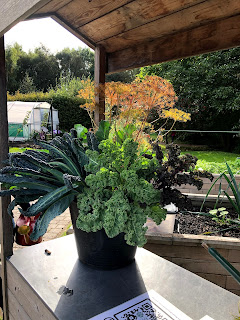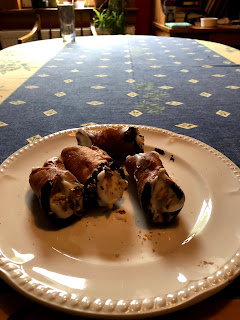Yesterday Benedict Ambrose and I got on the train for Carfin, as Una Voce Scotland had arranged a 11:30 AM outdoor Traditional Latin Mass at Carfin Grotto in the Diocese of Motherwell. I packed some freshly baked apple turnovers, in part to use up the all-butter puff pastry from Waitrose in the fridge. I also brought a Polish exercises workbook, in case of a delay somewhere, and I was very glad, as it made an excellent kneeler.
I wore my new burgundy brogue-boots and my hair in seven braids as well as my latest Denim Maxi-skirt of Indestructable Traddery, and I will get around to explaining why I mentioned this.
At Haymarket Station, we noticed other members of the "Edinburgh Crew" getting on the train. One of our bosom pals got onto our carriage, and another one, and some of the university youngsters, got on another carriage where they encountered beer-drinking Ranger fans.
Apparently the Ranger fans were affable and, as they do, pressed beer upon one of boys, but they also sang their songs and chanted their sectarian chants, or at least one that involved imaginary abuse of the Roman pontiff. I didn't ask in detail, but presumably they want to hang him from the chapel door or whatnot. Golly, something to think about when he turns up for the UN Climate Change Conference in Glasgow next month.
Ah, dear Lord. Trads may wail and seethe and fuss over Pope Francis' oeuvre, but at least we don't sing "It's the real thing: Pope on a string" like Rangers fans.
We alighted at Carfin and discovered that the National Shrine (with the grotto) is directly across the street from the railway station. B.A. and I had never been to the National Shrine, which includes an enormous park with a 1980s-looking church, a huge, freestanding parish hall, a pilgrim's centre, a glass chapel where a choir can sing through microphones and fill the park with song, dozens of memorial benches, dozens of pious statues in white, and flags. Very strangely, there is the Tricolour of the French Republic right beside the Grotto of Our Lady of Lourdes, and I have an inkling of what French Trads would have to say about that, e.g. Oh la la, la Vendee.
The National Shrine park is quite amazing, and I have literally never seen anything like it before. I see from the internet that the earliest part is the actual 1922 Grotto of Our Lady of Lourdes, and that is where our Mass was. There was an altar set up on a platform to the side of the full-scale depiction of the Lourdes apparition, and hundreds of folding chairs on at least two levels in front of the platform.
Besides the enjoyment of taking a turn in a big park which is quite obviously the green heart of the Catholic Church in Scotland, there was the joy of meeting old friends and acquaintances from the TLM communities across the country. There were at least 10 people (not including the tiny children) from the Edinburgh community, and I chatted with people who go to the TLM in Glasgow, Motherwell, and Dundee. All told there were somewhere between 150 and 200 people, which is not a huge number, I admit, but there were some large families I know noticeably absent. Next time I will do more to publicise the event myself.
The skies threatened rain and even spat at us a bit, but for the most part we were spared and could participate in the rosary and then the beautiful Mass unfolding before us without getting wet. And I do mean participate: I am utterly dumbfounded at the idea that Catholics who go to the TLM are passive spectators. The quality of concentration among TLM congregations is something almost unique in my experience, and of course there are the ritual actions of standing, bowing, kneeling, breast-beating, sitting, standing, and kneeling and breast-beating some more. TLM congregations also risk blowing off the roof when we sing whichever anthem during the Last Gospel. Yesterday, when we had no roof but the heavens, we sang Salve Regina. Really lovely.
The reading and Gospel were redundantly, but presumably obediently, read in English before the homily, just so you know. Nice for those among us who couldn't read the English side of the Mass sheet UV handed out, I suppose, although I can't imagine who that might have been. The under-7 set, perhaps?
Having madly socialised before Mass, and not done any socialising during Mass, we returned to mad socialising afterwards while the Edinburgh crew sans auto waited for our train. To my great joy, I met a long-time reader, a Cape Breton Canadian who teaches Gaelic to Scots, something I have long enjoyed thinking about. She was also wearing a Denim Maxiskirt (or Midi Skirt, to be precise) of Indestructable Traddery and handsome burgundy brogues, as well as a smart jacket and scarf. I also met an Italian Scot, her family from actual Rome, and we had an enjoyable conversation. I introduced my new Scottish colleague to various people I know and he didn't, and it was all marvellous.
When the Edinburgh base community (in the Liberation Theology sense) got on the return train to Edinburgh, we formed late-lunch plans, and six of us walked to an excellent pizza parlour where there was "laughter and good red wine." My cup ran over, for it was like pre-COVID--in fact, even like pre-cancer-- days.
Oh! And I have forgotten the cherry on top, which is total vanity, but listen, I'm over 40 here and this is why I mentioned the braids. As the two lovely young women, an undergrad and a young wife, and I (a thorn between two roses) walked ahead of the gentlemen along Dalry Rd., a bespectacled young man walked past us, turned, and told me that he really liked my hair.
"Thank you very much!" I said with a sunny smile, and when he turned around and strode off to his regular life, I punched my fists in the air.
"I'm [age]," I mouthed.
"I'm [age]," I told the other girls. "This isn't supposed to happen anymore."
"I'm [AAAAAGE]!!!"
The braids are staying.
Update: The apple harvest begins in earnest. This morning I picked 3 kg to be made into apple strudel. At long last, today I am going to learn how to make pastry so thin, my husband can read his newspaper through it--as my mother's old cookbook says.
In other apple news, left over apple turnover filling works beautifully with pancakes/crepes on a Sunday morning, especially if Sundays are exempt from the egg, soup, and super diet.
Finally, I tided up all around the apple tree yesterday, so that disease does not befall it. A few apples have sickened on the tree, which worries me a bit. I think from now on, I will weigh our crop as I pick it, and total it up so we have a record of yield over the years.





















